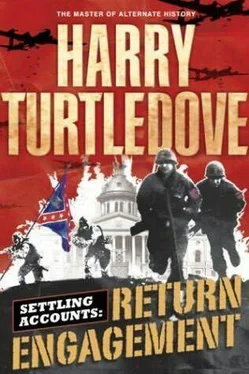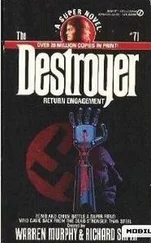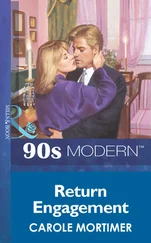Harry Turtledove - Return engagement
Здесь есть возможность читать онлайн «Harry Turtledove - Return engagement» весь текст электронной книги совершенно бесплатно (целиком полную версию без сокращений). В некоторых случаях можно слушать аудио, скачать через торрент в формате fb2 и присутствует краткое содержание. Жанр: История, на английском языке. Описание произведения, (предисловие) а так же отзывы посетителей доступны на портале библиотеки ЛибКат.
- Название:Return engagement
- Автор:
- Жанр:
- Год:неизвестен
- ISBN:нет данных
- Рейтинг книги:5 / 5. Голосов: 1
-
Избранное:Добавить в избранное
- Отзывы:
-
Ваша оценка:
- 100
- 1
- 2
- 3
- 4
- 5
Return engagement: краткое содержание, описание и аннотация
Предлагаем к чтению аннотацию, описание, краткое содержание или предисловие (зависит от того, что написал сам автор книги «Return engagement»). Если вы не нашли необходимую информацию о книге — напишите в комментариях, мы постараемся отыскать её.
Return engagement — читать онлайн бесплатно полную книгу (весь текст) целиком
Ниже представлен текст книги, разбитый по страницам. Система сохранения места последней прочитанной страницы, позволяет с удобством читать онлайн бесплатно книгу «Return engagement», без необходимости каждый раз заново искать на чём Вы остановились. Поставьте закладку, и сможете в любой момент перейти на страницу, на которой закончили чтение.
Интервал:
Закладка:
"Different kinds of casualties," he muttered. "Happy goddamn day." He ducked back into the tent to get ready for them.
They put Armstrong Grimes' company into two boxcars. It wasn't quite the 8 HORSES or 40 MEN arrangement the French had used during the Great War-Armstrong didn't think the cars had housed horses or cattle or anything similarly appetizing. But he did come to feel a strong and comradely relation with a sardine. The only difference was, they hadn't poured olive oil in after his buddies and him. Maybe they should have. The grease might have kept the men from rubbing together so much. Just getting back to the honey buckets was trial enough.
"How come we're so lucky?" he grumbled.
"Can't you figure it out for yourself?" Corporal Stowe asked. "I thought you were a smart fellow. You graduated high school and you stayed alive, right? That's why you made PFC."
Armstrong was convinced simply staying alive had more to do with the stripe on his sleeve than the high-school diploma did. He had that more because his old man would have walloped the snot out of him if he'd quit beforehand than for any other reason. Yeah, only about one guy in three in the USA did, but so what? It didn't mean anything to him.
He said, "Maybe I'm a moron especially for today, but I don't see what you're driving at."
"No, huh?" The grin the corporal sent his way wasn't especially friendly or amused. "All right-I'll spell it out for you. We're going where we're going on account of we ended up west of fucking Sandusky when the Confederates cut the country in half. If we'd been east of the goddamn place, they'd've done something different to us-I mean, with us."
"Oh." Armstrong Grimes thought it over. It made more sense than he wished it did. Getting from, say, Cleveland to Utah would have been hard, long, and dangerous. Getting from western Ohio to Mormon country was a straight shot-except, with luck, nobody would be shooting at them till they got there. He nodded. "Yeah, I guess maybe you're right."
"Bet your ass I am." Stowe's laugh was the laugh of a man waiting for the gallows the next morning. "I'll tell you something else, too: I'd sooner fight Featherston's fuckers than the damned Mormons. The Confederates play by the rules, pretty much. The Mormons, it's you or them, and they don't quit till they're dead."
"How do you know that?" Grimes asked.
"That's how it was in the last war, anyway," Stowe answered. "Men, women, kids-they threw everything at us but the kitchen sink. And they probably loaded that full of TNT and left it for a booby trap."
"Oh, boy," Armstrong said in a hollow voice. His father hadn't fought in Utah, and so he'd never had much to say about the Mormons. History books in school made them out to be bad guys, but didn't talk about them a whole lot. The books seemed to take the attitude that if you didn't look at them, they'd go away. All he knew about them was that they wanted to have lots of wives and they hated the U.S. government. The wives didn't seem to matter. Hating the U.S. government did.
The train rattled west. Every so often, it would stop at a siding. They'd open the doors to the boxcars and let the soldiers out to stretch. The country gradually got flatter and drier. They clattered over the Mississippi between Quincy, Illinois, and Hannibal, Missouri. The bridge had a nest of antiaircraft guns around it. Armstrong doubted they would have done much good had Confederate bombers come calling.
Missouri gave way to Kansas. Armstrong discovered why they called them the Great Plains. Nothing but miles and miles of miles and miles. Western Colorado was the same way. But then, in the distance, the Rockies poked their way up over the horizon. Those were mountains. Nothing Armstrong had ever seen in the eastern part of the USA prepared him for country like that.
The next day, the train went over them. Even the passes were high enough to make his breath come short. He was glad he didn't have to do anything serious there. The train went down the other side, but not so far down.
It stopped again in Grand Junction, Colorado, where the Gunnison and Colorado Rivers came together. Again, Armstrong was glad to get out and stretch. A sign on the train station said, biggest town in colorado west of the rockies. That might have been true, but it didn't strike him as worth bragging about. If Grand Junction had ten thousand people, that was pushing things. It was full of frame houses, most of them painted white. Not far from the railroad yards, several factories and packing plants dominated the business district.
Railroad workers hooked up a car full of coal and scrap iron in front of the locomotive. Pointing, Armstrong asked, "What the hell's going on there?"
Corporal Stowe laughed. Again, the sound didn't hold a whole lot of mirth. "Goddamn Mormons are mining the train tracks. Better if they blow up a car full of junk than an engine with people in it."
"Oh." Armstrong thought that over. "Yeah, I guess so." He eyed the forward car. "Bastards really are playing for keeps, aren't they?"
"I said so before. You better believe it," Stowe answered. Behind them, somebody blew a whistle. The noncom grimaced. "Time to get back in."
"Mooo!" Armstrong said mournfully. Stowe laughed once more, this time as if he really meant it.
Armstrong couldn't have said for sure when they crossed from Colorado into Utah. The train went at a crawl all the way. If that warning car did touch off a mine, the engineer wanted the damage to be as limited as possible. He was probably thinking more of his own neck than of his passengers'. Armstrong didn't mind. He was in no great hurry to meet the Mormons.
Nothing blew up in the trip across the rebellious state, for which he was duly grateful. The train stopped at a place called Woodside. Soldiers threw the doors to the cars open. "Out!" they yelled. "Out! Out! Out! This here's the end of the line."
"Jesus!" Armstrong said when he got a look around. "It sure as hell looks like the end of the line."
Grand Junction had been a small city. Woodside, Utah, was barely a wide place in the road. Along with a railroad depot, it boasted two gas stations and, between them, a trickle of water that had a sign above it: WOODSIDE GEYSER. DO NOT DRINK.
Armstrong jerked a thumb toward the sign. "What the hell's that?"
"Bad water, that's what," answered one of the men who looked to have been there for a while. "Railroad dug for water back around the turn of the century and got a gusher they couldn't cap. Only trouble was, it was bad water. People couldn't drink it. Cows kept trying-and kept dying. Ain't much of a geyser now, but from what the old-timers say it really used to be something."
"Oh, boy." Armstrong tried to imagine what being an old-timer in Woodside, Utah, would be like. If you had a chance between living here for fifty or sixty years and blowing out your brains, wouldn't you think hard about picking up a rifle?
But even the old-timers had probably never seen Woodside the way it was now. Green-gray tents spread out in all directions. For reasons known only to itself and possibly to God, the Army had decided to make this miserable place its chief staging area for moves against the Mormon rebels farther west. The rebels were holding the parts of Utah worth hanging on to. They seemed perfectly willing to let the Army have the rest.
Off in the distance, artillery muttered and growled. Armstrong was more familiar with that noise than he wished he were. He wasn't sorry to hear it at a distance, though. He'd heard artillery at much closer ranges than this. He'd heard soldiers after shells landed among them, too. He shoved that thought out of his mind. He didn't want to remember what happened when things went wrong.
For the rest of that day, things went right. He and his buddies lined up for showers-presumably not in water from the Woodside Geyser. They lined up again for chow. They got steaks and french fries, the first meal that didn't come out of cans they'd had since leaving Ohio. It wasn't a great steak, but the only thing really wrong with it in Armstrong's eyes was that it was too damn small.
Читать дальшеИнтервал:
Закладка:
Похожие книги на «Return engagement»
Представляем Вашему вниманию похожие книги на «Return engagement» списком для выбора. Мы отобрали схожую по названию и смыслу литературу в надежде предоставить читателям больше вариантов отыскать новые, интересные, ещё непрочитанные произведения.
Обсуждение, отзывы о книге «Return engagement» и просто собственные мнения читателей. Оставьте ваши комментарии, напишите, что Вы думаете о произведении, его смысле или главных героях. Укажите что конкретно понравилось, а что нет, и почему Вы так считаете.












